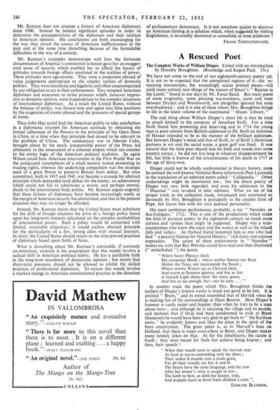A Rescued Poet
The Complete Works of William Diaper. Edited with an introduction by Dorothy Broughton. (Routledge and Kegan Paul. 15s.) WE have not come to the end of our eighteenth-century poetry yet. It is not to be expected that the unexplored regions of it—the re- maining manuscripts, the exceedingly scarce printed pieces—will yield many entirely new things of the stature of Smart's " Rejoice in the Lamb," found in our days by Mr. Force Stead. But many poets of some originality, some pleasing waywardness, came and went between Dryden and Wordsworth, not altogether ignored but soon overshadowed ; and it is one of.these whom Mrs. Broughton brings to life in the latest volume of the reanimated " Muses' Library."
The odd thing about William Diaper's short life is that he tried to attach himself to the company of Jonathan Swift. For a time Swift found him promising and deserving, and in 1714 the young man (a poor scholar from Balliol) addressed to Dr. Swift an imitation of Horace intended to be in the manner of the brilliant addressee. But between Diaper's mind and that of Swift, or of Swift's illustrious partners in wit and the social scene, a great gulf was fixed. It was natural that the little poet should lose his hold and recede into some country curacy ; he did not live long in whatever disappointment he felt, but little is known of the circumstances of his death in 1717 at the age of thirty-two. .
Diaper could not be wholly unchronicled in literary history, since he assisted the well-known Nicholas Rowe (afterwards Poet Laureate) in the translation of an admired poem called " Callipaedia." Other undertakings might be mentioned too ; but the direct poetry of Diaper was very little regarded, and• even his admission to the " Dunciad " was revoked in later editions. What we see of his proper work in the collection made, introduced and annotated so devotedly by Mrs. Broughton is principally in the couplet form of Pope, but haves him with his own poetical personality.
His most ambitious performance, probably, is his " Nereides, or Sea-Eclogues," 1712. This is one of the productions which make the field of pastoral poetry in the eighteenth century so much more curious and various than might be supposed. Diaper was a west- countryman who knew the coast and the waters as well as the inland hills and valleys. An Oxford friend lamented him as one who had had " a peculiar Genius for Natural History," rich fancy and copious expression. The union of these endowments in " Nereides " makes me wish that Rex Whistler could have read and then illustrated (" embellished ") the poem,
" Where hoary Phorcys feeds His numerous Herds ; where neither Storms nor Rain Molest the Trees, nor incommode the Swain ; Where unmixt Waters are as Chrystal clear, And warm as Summer glooms, and fine as Air.
A faintish Light shines thro' the watry green,
And lets us see enough, but—not be seen. ... "
In another track the poem which Mrs. Broughton thinks the earliest of Diaper's known works is much too good to be lost. It is entitled " Brent," and its mood resembled that of Herrick when he is making fun of his surroundings at Dean Bourne. Here Diaper's humour is vastly easier and happier than when he tries to be a man about town ; and although he is Satirising the village and its people, and declares that if Ovid had been condemned to exile at Brent (Somerset) he would have been very glad to get back to " the Scythian snow," he evidently knows and likes the place in the spirit of the born countryman. The great point is, as in Marvell's lines on Holland, that there is water everywhere at Brent, and Diaper makes many homely jokes on that. As for the inhabitants, the curate is frank ; they were meant for fools but achieve being knaves ; and then, their speech !
" When they would seem to speak the mortals roar As loud as waves contending with the shore ; Their widen'd mouths into a circle grow, For all their vowells are but A and 0.
The beasts have the same language, and the cow After her owner's voice is taught to low ; The lamb to baw, as doth her keeper, tries, And puppies learn to howl from children's cries."„
EDMUND BLUNDEN.


































 Previous page
Previous page